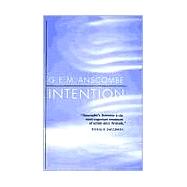
Note: Supplemental materials are not guaranteed with Rental or Used book purchases.
Purchase Benefits
Looking to rent a book? Rent Intention [ISBN: 9780674003996] for the semester, quarter, and short term or search our site for other textbooks by Anscombe, G. E. M.. Renting a textbook can save you up to 90% from the cost of buying.
| The subject introduced under three heads: expression of intention for the future, intentional action, and intention in acting | |
| Intuitive understanding of the difference between 'prediction' and 'expression of intention' rejected as a foundation for a philosophical account of expressions of intention | |
| Prediction defined so as to comprise orders and expressions of intention as well as estimates of the future | |
| The falsity of expressions of intention in the simple future tense (a) as lying and (b) as falsity because the intention is not carried out | |
| Usefulness of considering the verbal expression of intention for the future in order to avoid various dead ends | |
| Uselessness of an introspective explanation of intention | |
| Expressions of intentions distinguished from estimates of the future by the justification, if any, given for them | |
| Are there any statements of the form 'A intends X' which can be made with fair certainty? Descriptions of a man's actions often descriptions truly substitutable for 'X ' in 'A intends X' | |
| Reasons why we suppose a man the sole authority on his own intentions | |
| Intentional actions defined as those to which a certain sense of the question 'Why?' is given application | |
| Difficulty of defining the relevant sense and danger of moving in a circle in our explanations of 'reason for acting' and 'action' | |
| 'I knocked the cup off the table because I was startled' gives an answer to a question 'Why?' about something done | |
| The question 'Why?' is refused application by the answer 'I did not know I was doing that' | |
| The same action can have many descriptions, in some of which the agent knows it and in some not | |
| The question also refused application when the action was involuntary; but this notion cannot be introduced without treating as solved the very kind of problem we are discussing | |
| Difficulties of the notion 'involuntary' | |
| 'Non-observational knowledge' introduced as e.g. the knowledge one has of some of one's own movements | |
| There is also non-observational knowledge of the causation of a movement, as when I say why I gave a start | |
| We can define one class of involuntary movements without begging any questions, as the class of movements known without observation, but where there is no room for non-observational knowledge of causality: e.g. the muscular spasm one sometimes has in dropping off to sleep | |
| In one sense of 'Why?' the answer mentions evidence; but an answer to a question 'Why?' about an action, which does not mention evidence, does not therefore necessarily give a reason for acting | |
| The cases where it was difficult to distinguish a cause from a reason turn out to be ones where there is non-observational knowledge of the causation | |
| This kind of causation labelled 'mental causality' | |
| Mental causes should be distinguished from motives of actions and objects of feelings | |
| And also from intentions with which a person acts, even though these may be expressed in the form 'I wanted...' Mental causality is not important in itself, but it is important to make these distinctions | |
| Motives have been sharply distinguished from intentions by philosophers, and described as causes | |
| Popularly motive and intention are not so distinct; but 'motive' is a wider notion than' intention' | |
| A motive is not a cause at all | |
| Among motives that are not intentions for the future we can distinguish between backward-looking motives like revenge (I killed him because he killed my brother) and motive-in-general (He did it out of friendship) | |
| Motive-in-general can also be called 'interpretative' motive | |
| What distinguishes backward-looking motives from mental causes? The notions of good and harm are involved in them | |
| In some cases the distinction between a mental cau | |
| Table of Contents provided by Publisher. All Rights Reserved. |
The New copy of this book will include any supplemental materials advertised. Please check the title of the book to determine if it should include any access cards, study guides, lab manuals, CDs, etc.
The Used, Rental and eBook copies of this book are not guaranteed to include any supplemental materials. Typically, only the book itself is included. This is true even if the title states it includes any access cards, study guides, lab manuals, CDs, etc.